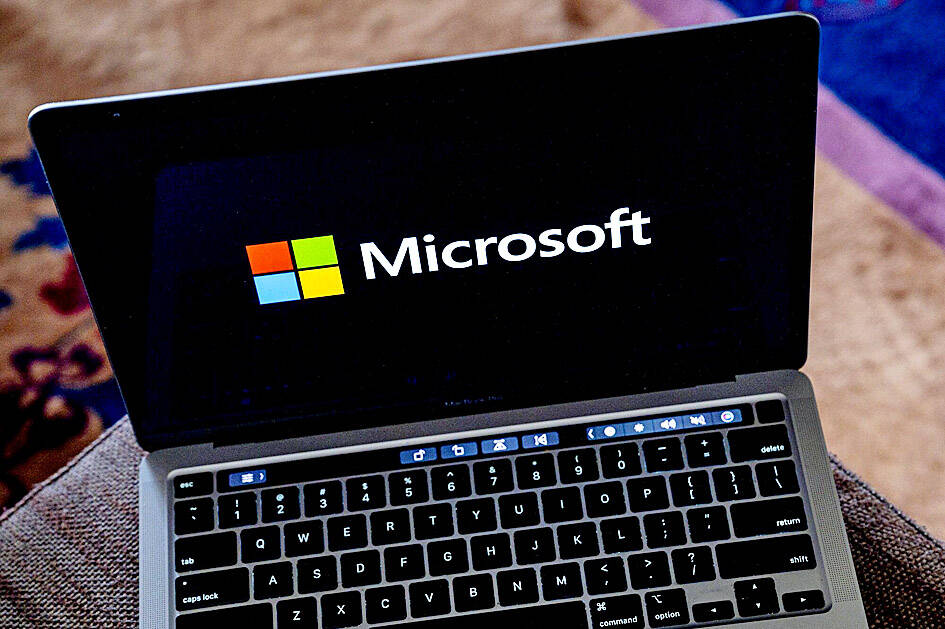Microsoft Corp is adding a button to the Windows keyboard to activate its artificial intelligence (AI) Copilot service, with the first devices to sport the new key available this month.
The Copilot key, which will sit to the right of the space bar, is the first change to the Windows keyboard layout since Microsoft added the Windows/Start key in 1994, underscoring the company’s commitment to AI.
Microsoft’s hardware partners will show off Windows 11 computers with the Copilot button over the coming days at the CES technology conference and, over time, it will become a required feature.

Photo: Bloomberg
The shortcut will help users create images, write emails and summarize text with the help of AI.
“AI will be seamlessly woven into Windows from the system, to the silicon, to the hardware,” Microsoft consumer chief marketing officer Yusuf Mehdi said in a blog announcing the change.
The Redmond, Washington-based company sees this year as “the year of the AI PC,” mirroring the budding trend among smartphone makers to tout their latest models as “AI phones” Mehdi said.
Those labels do not carry much weight by themselves, but Microsoft has spent the past year retooling its biggest products around AI tech that can generate new content from massive datasets.
That list now includes Windows, Office, Bing search, security software and customer and finance products. The work heavily leverages the GPT-4 technology from OpenAI, in which Microsoft has invested US$13 billion.
For device makers, Microsoft’s push into AI services has not yet translated into a boost for sales, as the novel Copilot features are being rolled out to new and existing devices alike. Mehdi’s promise of weaving AI into hardware and silicon may signal more pressure on consumers to upgrade as Microsoft evolves and improves its AI proposition.

Intel Corp chief executive officer Lip-Bu Tan (陳立武) is expected to meet with Taiwanese suppliers next month in conjunction with the opening of the Computex Taipei trade show, supply chain sources said on Monday. The visit, the first for Tan to Taiwan since assuming his new post last month, would be aimed at enhancing Intel’s ties with suppliers in Taiwan as he attempts to help turn around the struggling US chipmaker, the sources said. Tan is to hold a banquet to celebrate Intel’s 40-year presence in Taiwan before Computex opens on May 20 and invite dozens of Taiwanese suppliers to exchange views

Application-specific integrated circuit designer Faraday Technology Corp (智原) yesterday said that although revenue this quarter would decline 30 percent from last quarter, it retained its full-year forecast of revenue growth of 100 percent. The company attributed the quarterly drop to a slowdown in customers’ production of chips using Faraday’s advanced packaging technology. The company is still confident about its revenue growth this year, given its strong “design-win” — or the projects it won to help customers design their chips, Faraday president Steve Wang (王國雍) told an online earnings conference. “The design-win this year is better than we expected. We believe we will win

Quanta Computer Inc (廣達) chairman Barry Lam (林百里) is expected to share his views about the artificial intelligence (AI) industry’s prospects during his speech at the company’s 37th anniversary ceremony, as AI servers have become a new growth engine for the equipment manufacturing service provider. Lam’s speech is much anticipated, as Quanta has risen as one of the world’s major AI server suppliers. The company reported a 30 percent year-on-year growth in consolidated revenue to NT$1.41 trillion (US$43.35 billion) last year, thanks to fast-growing demand for servers, especially those with AI capabilities. The company told investors in November last year that

Power supply and electronic components maker Delta Electronics Inc (台達電) yesterday said it plans to ship its new 1 megawatt charging systems for electric trucks and buses in the first half of next year at the earliest. The new charging piles, which deliver up to 1 megawatt of charging power, are designed for heavy-duty electric vehicles, and support a maximum current of 1,500 amperes and output of 1,250 volts, Delta said in a news release. “If everything goes smoothly, we could begin shipping those new charging systems as early as in the first half of next year,” a company official said. The new